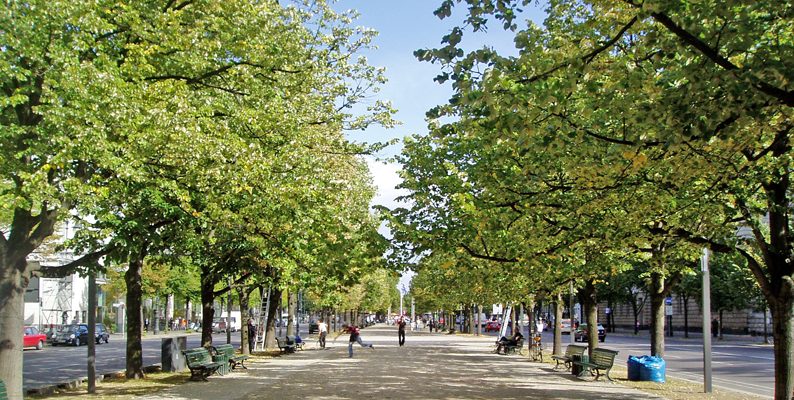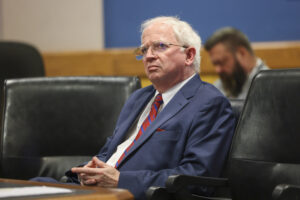Urban Trees Thrive as Cities Warm, Study Shows
Researchers find that trees are undergoing a longer growing season as a consequence of climate change. Trees along a boulevard help cool Berlin. (Dimitry B / Wikimedia Commons)
Trees along a boulevard help cool Berlin. (Dimitry B / Wikimedia Commons)
City trees are feeling the heat—and loving it. As the global climate changes, trees worldwide are growing briskly, but those basking in the warmth of urban heat islands are growing even faster.
Their root space may be more cramped, their leaves may be assaulted by more pollution, but the limes along Unter den Linden in Berlin, and the London planes of Paris, France are flourishing, to make life a little better for the citizens who walk in their shade.
“We can show that urban trees of the same age are larger on average than rural trees because urban trees grow faster,” said Hans Pretzsch, a forester at the Technical University of Munich, who led the study that uncovered the trees’ behaviour.
“While the difference amounts to about a quarter at the age of 50, it is still just under 20% at a hundred years of age.”
Researchers from Germany, France, Japan, Vietnam, Australia, South Africa, Chile and the US write in the journal Scientific Reports that they sampled the heartwood of 1,383 mostly mature trees in 10 cities in a range of climate zones, from boreal, temperate, Mediterranean and subtropical.
The cities were Berlin, Brisbane, Cape Town, Hanoi, Houston in Texas, Munich, Paris, Prince George in Canada, Santiago de Chile and Sapporo in northern Japan. The species were Sakhalin fir, white spruce, small-leaved lime, horse chestnut, London plane, black locust, English oak, African mahogany, hoop pine and water oak.
Altogether the scientists worked with 73,685 observations of stem diameter growth over several decades. And they found that urban trees were responding to the notorious heat island effect while at the same time enjoying a longer growing season as a consequence of climate change driven by higher atmospheric levels of carbon dioxide, which follow from profligate human combustion of fossil fuels.
Research of this kind matters: more than half of humanity now lives in cities and by 2050 the urban population will have grown to two thirds of all the people on Earth.
Trees and green spaces offer city dwellers some relief from heat extremes, they help cut heating and air-conditioning costs, and improve health so effectively that one research team calculated a square kilometre of urban trees was worth $1.2 million to its citizens. A second study found that avenues of city trees added $1bn to property values in California.
Inner cities can be between 3°C and 10°C (37.4 F and 50 F) warmer than the surrounding countryside. Although warmer conditions mean more vigorous photosynthesis and longer growing seasons, this more energetic growth could shorten the life cycle, the scientists warn. As the world warms, trees in the hinterland are affected too.
But urban growth might not be entirely bad for the soils on which new roads, housing estates, factories and tower blocks will be built in the next few decades. A consortium of Russian, Dutch and Italian scientists report in the Journal of Cleaner Production that they found that as cities grew, so did urban green areas.
Although soil carbon was lost when streets were paved, the remaining urban soils were systematically enriched by peat, compost and new plants. By 2048, Moscow is expected to extend by at least 30%, with the loss of up to 2,000 sq km of forests, farmland and marsh.
“The results of our study show the potential of urbanisation for the increase of soil organic carbon stocks. This process, in turn, would probably mitigate the effects of climate change,” said Vyacheslav Vasenev of the agro-biotechnology department of the RUDN, the People’s Friendship University of Moscow.
“The optimistic conclusion of our study should be further explored by land-use planners and scholars worldwide, since urbanisation will be progressively more important in the future.”
Your support matters…Independent journalism is under threat and overshadowed by heavily funded mainstream media.
You can help level the playing field. Become a member.
Your tax-deductible contribution keeps us digging beneath the headlines to give you thought-provoking, investigative reporting and analysis that unearths what's really happening- without compromise.
Give today to support our courageous, independent journalists.






You need to be a supporter to comment.
There are currently no responses to this article.
Be the first to respond.